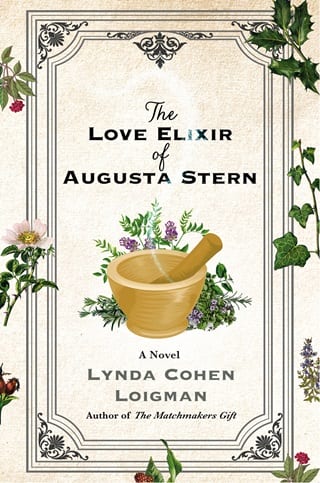Chapter Forty-Four
FORTY-FOUR
SEPTEMBER 1926
For the first two weeks after Irving left for Chicago, Augusta spent most of her time in bed with her face turned toward the wall. She barely moved when Esther came into the room to leave her plates of toast and tea. It was Bess who finally forced her outside, Bess who made her put on a bathing suit and dragged her to the swimming pool at Betsy Head Park. In the water, Augusta was able to shut out the questions that ran on a constant loop in her head. How could Irving have done this to her? Who was the man she thought she knew? Had he ever truly loved her, or had he only been playing a part? She began going to the pool every day, swimming laps with a feral intensity. By the end of the summer, her arms were so strong that she was able to lift the heaviest boxes onto the highest shelves of her father’s stock room.
In September, Augusta began taking classes for her degree at the Fordham College of Pharmacy. On Mondays, Wednesdays, and Fridays, she traveled via the elevated train to the corner of Bathgate Avenue and East Fordham Road in the Bronx. Tuesdays and Thursdays were for “Practical Pharmacy,” which meant she earned credit working at her father’s store. The deluge of homework, papers, and exams filled the space where her hopes for a life with Irving had been. For the next few months, she was so tired that although she and Esther still shared a bedroom, she fell asleep without hearing Esther’s cough.
Her great-aunt’s sickness began with a winter flu. Initially, Esther recovered, but even after the cough disappeared, the color did not return to her cheeks. Dr. Birnbaum was consulted, and various stimulants were prescribed. Esther accepted the doctor’s medicine graciously, but it never seemed to do much good. Augusta’s father made a tonic, but the liquid only gave Esther a headache. By December, Esther stopped seeing clients.
That was when Augusta started making soup.
Once a week, she visited the butcher to choose the chickens for the broth. In between reading her books, she chopped mountains of carrots, onions, and celery. When she asked Esther what else to add, Esther shrugged her bony shoulders. “Add whatever feels right,” she said. “Parsley today, garlic next week. I never made mine the same way twice.”
In the evenings, after they were both in bed, Augusta would tell Esther about school. One evening she described her botany class. “You would love it,” she said. “The Botanical Garden is right next to campus, and our professor likes to take us for visits. Physiology is definitely the most difficult—we’re learning all about digestion and the way our bodies absorb different medicines.”
“Are there many other women?” Esther wanted to know.
“Five of us in my grade. Two hundred men and five women.”
“At least you aren’t alone,” said Esther. “It’s good to have other female colleagues.”
“Were there any other women in your village who did the same work as you?”
“No,” said Esther. “Only one man. We did the same work, we healed the same illnesses, but they called him the apothecary and they called me the witch.” Her voice grew melancholy as she continued. “He was the man I fell in love with, the one I made the elixir for. I didn’t tell him what it was—I was young and impatient.”
Augusta sat up against her pillow. This was the story she’d been wait ing to hear. This was the lesson Esther wanted her to learn. “What happened after he drank it?”
“He told me that he loved me deeply, but he didn’t want to marry me. He was adamant that he would never marry a woman with a talent that rivaled his own. I told him about the elixir then, and he was furious that I had given it to him without asking. He refused to speak to me ever again.”
“Oh, Aunt Esther, I’m so sorry.” Augusta pulled the blankets up to her chin, her heart aching from the tragic implications of her great-aunt’s revelation. After a long silence, she forced herself to ask the question that had been haunting her ever since Irving left Brooklyn. “Do you think women like us can ever have both? Can we have our work and have love? Or will we always have to choose?”
Esther’s voice grew tired and faraway. “I do not know the answer,” she said. “I can only hope that this new world is kinder to women like us than the old one.”
As the weeks wore on, Esther’s health grew worse. Her ninety-two-year-old heart was failing, and Dr. Birnbaum insisted there was nothing he could do. Meanwhile, Augusta, refusing to give up, consulted her books, looking for remedies. She described her great-aunt’s symptoms to her professors. She searched the school library for answers. Esther tried to tell her the truth—that Dr. Birnbaum was right.
“Goldie, please. There is no medicine on this earth that will be able to fix my heart.”
“You can’t give up yet, Aunt Esther! Remember what Dr. Birnbaum said about Irving? Or what the doctors said about Mrs. Dornbush?”
Esther forced her lips into a smile. “This time the doctors are correct.”
“No,” said Augusta, her composure unraveling. “I don’t believe that. Let me try—tell me what herbs I should use. There must be a recipe I don’t know yet. Tell me the ingredients for a new powder. Let me try to make it for you.”
“Goldie, do you remember what I told you when you asked whether I could have healed your mother? Sometimes, no matter what we do, a person’s time on this earth must end. I have lived for ninety-two years, and that will have to be enough for me.”
“But it isn’t enough for me, ” said Augusta, trying to hold back her tears.
That night, after Esther was asleep, Augusta carried the apothecary case into the darkened kitchen. She lit the candles, she summoned the moonlight, she pulled every heart-healing herb she could think of from Esther’s bottles and tiny vials: hawthorn berries, turmeric, juniper, red sage root, hibiscus. As she ground the ingredients in Esther’s mortar, she sang the now-familiar words.
To ease the pain of those who suffer
To repair the bodies of those who are ill
To restore the minds of those in need
The scents grew stronger, swirling around her like a benevolent tornado. Augusta shut her eyes to sing. To pray. To plead. To beg of the moonlight. But when she opened her eyes, the scents fell flat, the candles sputtered, and the room turned cold.
She emptied the contents of the mortar onto a square of Esther’s muslin. The powder was wholly unremarkable, but she saved it anyway.
The next day, before Augusta served Esther her soup, she sprinkled the powder into the broth. Esther ate the entire bowl, but the soup seemed to have no healing effect. As the afternoon wore on, Esther grew increasingly weak. “I’ve taught you well, Goldie,” she whispered. “When I am gone, you will take my case. You will take my mortar, my pestle, my robe. You will learn everything you can at school and be the best of both your father and me.”
Augusta gripped her great-aunt’s hands, as if trying to pull her back into this world. “Please, Aunt Esther, please don’t leave. Let me try again with another recipe. I’ll do a better job tonight. I’ll bring you a fresh bowl of soup tomorrow.”
Aunt Esther’s smile was full of love, but the old woman was resigned. “You have brought me more comfort than you can imagine, more than an old woman deserves. But there is no magic any of us have that can make someone live forever.”
The condolence card from Chicago came only one week after Esther’s funeral. Augusta wondered how Irving heard the news so quickly, but she supposed that his in-laws still had contacts in town. The stationery was gilt-edged and gaudy—selected by Lois, without a doubt. Mr. and Mrs. Irving Rivkin was engraved in gold lettering at the top. Augusta felt sick from the sight of it—when she traced the gold letters, her fingers burned.
Dear Augusta, it said. I am so sorry for your loss. Yours truly, Irving Rivkin.
The words were so simple but so burdened with meaning that Augusta wanted to scream. Which loss was he referring to? She had lost him—the love of her life. She had lost the life that was supposed to be hers. She had lost her greatest mentor and champion. Since Esther had first come into their lives, Augusta had aspired to be the best of both her father and her aunt: to pair Solomon’s wisdom with Esther’s insight so that she might treat every customer in the most holistic and thorough fashion. But now her confidence had waned.
By the time Augusta received Irving’s note, she was no longer the golden girl he remembered. When she’d first met him, she had barely wanted to look up from her books. But when she did, Irving had seen her. He’d seen her intelligence and her ambition. He’d recognized the light that glowed inside her. It was no wonder that Irving had liked her nickname. But she could not be Goldie anymore. She’d lost her belief that she was worthy of Aunt Esther’s teachings. She’d lost her faith in the last scraps of magic that might be left in their dreary world.
As she tore Irving’s note into bits, Augusta made a silent vow. She might have failed to heal Esther, but she would not fail another patient again. She would study and earn the highest marks in her classes. She would learn as much as she could to make her great-aunt and her father proud.
She would never eat another bowl of chicken soup again.
 Fullepub
Fullepub 



